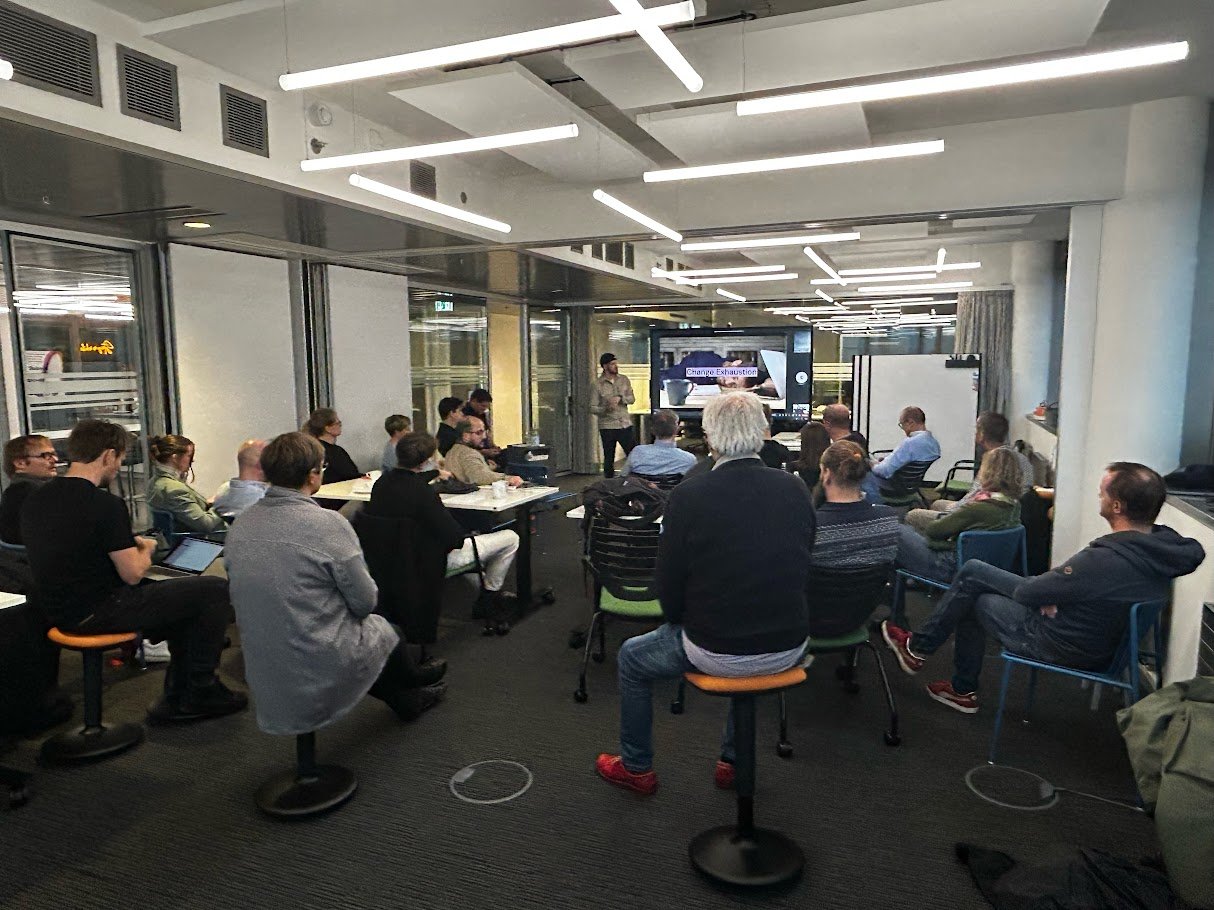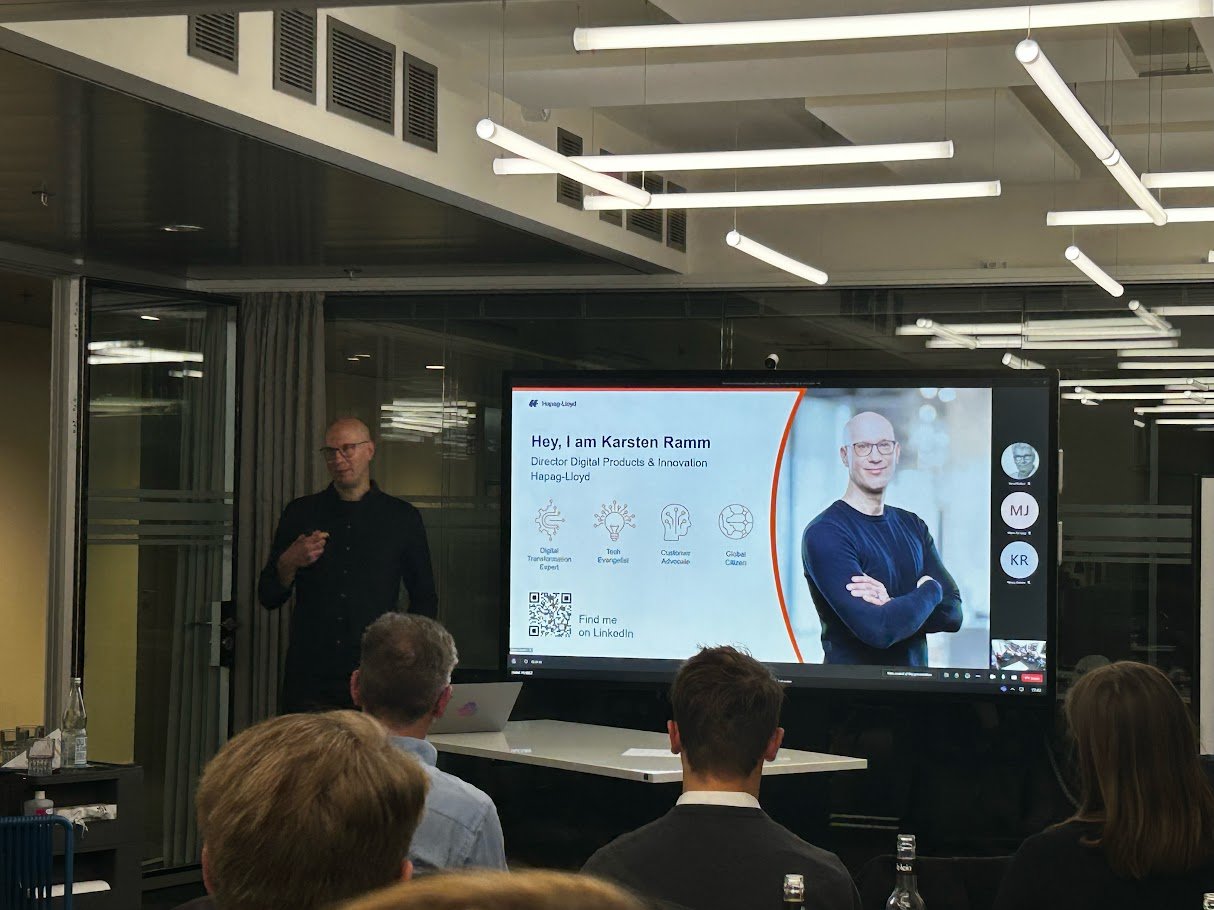By Janus Boye
What happens when you bring together leaders from different industries who are working on different fields?
Yesterday our digital transformation friends at diconium in Hamburg hosted our sold out annual Christmas member's meeting, where we had an afternoon of learning and networking across the different fields we cover including design leadership, employee experience, digital strategy and product management.
A packed meeting room at diconium for our final 2023 session in Hamburg.
As the legendary advisor and influential consultant Ram Charan famously said:
"Listening isn't just hearing; it requires the willingness to entertain other viewpoints - especially opposing ones"
Like a miniature version of our 3-day Aarhus conference, we made it through 10 lightning talks in a packed afternoon with quite some thought provoking perspectives. In between we had a bit time for reflections and the conversation continued over some good food, but we actually started somewhere else.
Where are we now?
diconium in Hamburg has a well assorted selection of warm and cold drinks. A refreshment area that almost resembled a frequent flyer lounge in an airport
In a market that moves quickly, innovates and never seems to get boring, this question can actually be quite tough to answer. Clearly much has happened this year with the arrival of tools like ChatGPT on the main stage, but still it’s all about people and people making the difference.
We opened with our host Michael Sommer, Director Partner Management at diconium, who gave us a brief introduction to where we were. Located with views to the harbour of Hamburg and overlooking the Elbe river, we found ourselves in the well-located Hamburg office of a digital commerce consulting firm that’s clearly adopted hybrid working.
Being a wholly owned subsidiary of German car manufacturer Volkswagen, they’ve clearly kept their own brand and DNA, while doing impressive work with their more than 2,000 employees in interdisciplinary teams of consultants, data experts, and software developers across 14 locations in Europe, North America, and Asia.
Before we moved onto the 10 talks, and to bring everyone up to speed, we heard some takes on the highlights from the recently held Boye Aarhus 23 conference. Here’s just a few of the speaker highlights from the conference that was mentioned in the impromptu quick session:
Steven Pemberton, an Amsterdam-based Internet pioneer and his keynote on “There’s no I in AI”. He also gave a lightning talk on An end to the paper internet.
Nina Horstra from Booking.com and her work on why should we do research on Sustainability before designing anything
Rhiannon Davies and her insights on leading digital. Rhiannon is Deputy Director of Digital Experience at University of Bristol and gave an inspiring keynote on how the role of digital teams has never been more crucial.
Rasmus Skjoldan, Chief Evangelist at Magnolia who covered what we might learn from the arts to make digital experiences suck less.
Having covered the conference, always a big thing in our community, we then got the speakers plugged in and moved onto the talks.
10 talks on trust, sustainability, AI, design MarTech and more
Below I’ve shared a few notes from each talk. The program was very much a work in progress up until the day, and in hindsight, we were missing a big topic or two, but it’s also a people product, so changes happen.
First up was Kevin Hähnlein from local employee communications vendor Haiilo. He reminded us that it’s employers that we trust the most, citing the annual Edelman Trust Barometer, and this also means that internal communicators are important agents of trust. This further underlines why social responsibility is key.
Next was Philipp Grochowski who joined us from Berlin-based software vendor Vier.ai. They focus on customer conversations and he mixed psychology and AI to help us understand and grow together. In brief, their solution looks at the words we use in conversations and then it analyses it based on corporate values to facilitate mutual understanding and sustainable change. When you think about it, it’s quite a plot twist: Might AI help us be more human?
Co-founder of Ninetailed Andy Kaiser talked about how personalisation is changing
Also joining us from Berlin was Andy Kaiser, co-founder of Ninetailed, a fast growing start-up focusing on experimentation and personalisation. His talk was on bridging the gap between AI, Data and Composable MarTech, but he opened by citing Mark Demeny and his work on whether the hype around personalisation is dead
Our fourth speaker, Vasilis Avlonitis joined us from Dublin, where he works as Senior Delivery Manager at EPAM. Previously he’s worked much with Umbraco, but recently he’s been mostly on projects using either Optimizely or Adobe Experience Manager. As one of our new members in Q4, this was actually his very first in-person meeting and he hit a home run talking about DXP technology selection and bias. Some memorable points like:
Authors (content contributors) are still ignored. The bigger the organisation, the more they are ignored
The original problem statement is rarely the actual problem
The bigger the organisation, the less options they have
We then shifted to design leadership, with a talk by Björn Gaworski-Dammann. He’s an experienced product leader at local software vendor CoreMedia. He brought a case study of the design challenges faced with modernising a 15 year old software product.
Björn from CoreMedia showed this screenshot of CoreMedia Studio v2. An editorial interface where development and product design started in 2007.
One obvious take away is: Don't wait that long. While tech frameworks have changed much in 15 years, it seems likely that this will continue, so the dilemma is a familiar one - You keep prioritising new features, but when do you also modernise the interface?
Bringing us from design to content, Jeffrey “jam” McGuire, not only made us laugh, but also made us think about content strategy and opinionated content in the age of AI. Jam works as a consultant at Open Strategy Partners, a Cologne-based B2B content marketing agency for tech product and service companies.
Jam on stage talking about strategy in the 2023 age of AI
Jam’s talk was titled: “Garbage in, garbage out. Content strategy and creation in the age of late 2023 AI”. He covered how AI is changing content and argued quite convincingly that content strategy is more important than ever. Download slides (PDF).
We then moved to the senior leadership perspective, where Marco de Jong, Director Digital Platforms & Processes at Danfoss Drives, brought sales and senior leadership perspective to digital strategy and in particular the customer journey at a large, complex and global firm.
The focus for Karsten Ramm was the customer shift.
Staying on the customer side, Karsten Ramm, Director Digital Products & Innovation at shipping firm Hapag-Lloyd, talked about the customer shift and the creative mindset. His deck was sorted in four memorable parts:
New realities
New customer expectations
New principles
New approaches
In terms of mindset, he also showed how in his 20+ years at Hapag-Lloyd the conversation has evolved from initially being about changing a fixed mindset to an open mindset. Today, it’s all about the growth mindset, where challenges help you grow and where effort and abilities determine abilities. And, as Karsten said, a future requirement will be the emerging creative mindset, where technology is an enabler, you need to be open to the process of change and creativity is a part of your daily work.
Thorsten Jonas also weaved in AI with this question at the end of the session: How can we make sure we use AI in an ethical and sustainable way? A good discussion to have now and not 10 years after the fact as we’ve unfortunately done with social media
Up next was Thorsten Jonas who founded the Sustainable UX Network in 2022. He introduced us to the new Web Sustainability Guidelines, which previous Boye speaker Chicago-based Tim Frick has played a large role in.
Not entirely unexpected, he had a few slides towards the end of his talk on the massive energy consumption by large language models and the new AI tools. As shown in the photo, he finished with a big AI question for us to think about. Download slides (PDF)
Last, but not least, Beth Wegner wrapped up and briefly talked about her new design leadership role at Elastic. A role with many new technical details to understand and something we’ll hopefully hear more about in our local design leadership peer group in 2024.
Learning together towards 2024
I certainly learned something new from the 10 talks, and also enjoyed catching up with local members. To the participants some talks might have been more relevant than others, but the magic wouldn't be there, if everything was what you thought you needed right now. Because, who knows what 2024 will bring?
Thanks Bernd Burkert and Michael Sommer for hosting us and making it possible to bring our community together and prepare for next year in a friendly and down-to-earth setting.
Once we’ve landed in 2024, we have a full learning program in Q1. There’s CMS Kickoff 24 in January in Florida, where we have a few European participants, including from CoreMedia, Kentico, Kontent.ai, TYPO3 and Umbraco. There’s also local meetings in all our peer groups.
See you!







